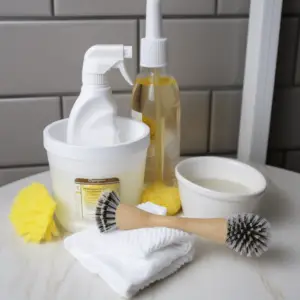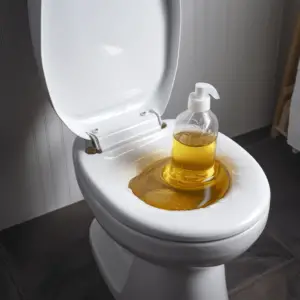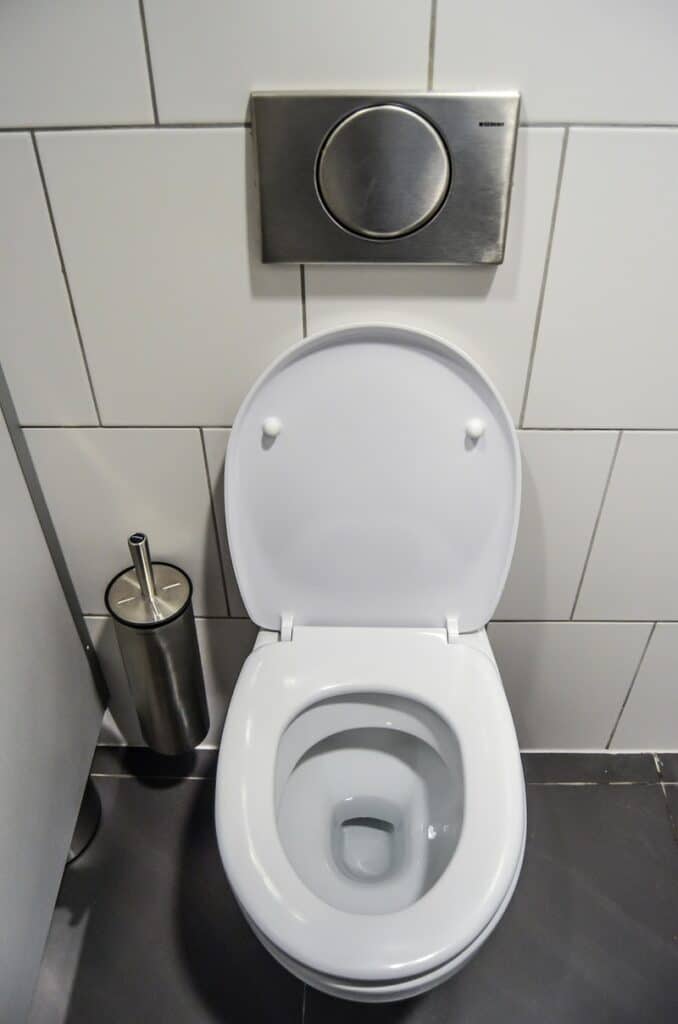Toilet Cleaning with Vinegar lately heard that you can clean your toilet with vinegar, you might be wondering if it would actually work or if it will just make a huge mess. Is it an idea you should go for, or are toilet bowls damaged by vinegar?
Table of Contents
Does Vinegar Damage Toilet Bowls?

Toilet bowls are not damaged by vinegar. Vinegar is frequently utilized as a natural, environmentally friendly alternative to all-purpose commercial cleansers. You may use vinegar with other all-natural products (such as baking soda) to improve toilet cleaning.
Bleach is a common ingredient in all-purpose cleansers but has long-term health impacts. This article covers how to clean your toilet with vinegar, the advantages of doing so, and why you should use natural products instead of synthetic ones.
How to Use Vinegar to Clean Your Toilet
To utilize vinegar in cleaning your toilet bowl, put three cups of vinegar into the toilet bowl and let it sit for an hour. Next, add a cup of baking soda and use a toilet brush to scrub the spots away.
If you’re happy with the outcome, flush the vinegar and soda mixture away. You might also flush the toilet and then fill the tank with vinegar.
Allow the vinegar to work its magic on your tank’s mold, germs, and filth by letting it sit overnight.
What Amount of Vinegar is Required to Clean a Toilet
Three cups of vinegar should be enough to help you clean your toilet bowl. After adding the vinegar to the bowl, you should let it sit for an hour. Add one cup of baking soda, then scrub away the stains! Although you would need extra vinegar to clean your toilet tank.
The amount of vinegar to use in your tank is determined by the capacity your tank holds. Most tanks, however, hold up to 1.6 gallons of water.
Therefore, after flushing your toilet, add 1.6 gallons of vinegar to the tank and let it sit for at least one night.
Why Should You Use a Vinegar-Tipped Cloth on the Toilet?
You can clean your toilet using a cloth that has been dipped in vinegar. This can be utilized as an alternative to cleansers that contain bleach.
Put the cloth dipped in vinegar over the toilet bowl’s edges over the stains.
It’s crucial to leave this cloth covering the stains in place for a couple of hours. The stains will eventually disappear due to the vinegar’s reaction with the grime and dirt.
Turn off the water valve before attempting to clean stains from your toilet bowl with cloths dipped in vinegar.
Can You Use Vinegar to Remove Rust From a Toilet Bowl?
Yes. You can use vinegar to remove rust from your toilet bowl.
The bottle of distilled white vinegar you most likely have on your kitchen shelf with 4 to 8 percent acetic acid concentration is potent enough to get the job done. But horticulture vinegar, which has an acetic acid content of up to 45%, will yield results more quickly. Wear protective gloves and goggles if you use that acid because it is potent and should be dealt with care.
To remove rust at the water line and below, pour the vinegar directly into the toilet bowl and let it sit for a few hours. Make a paste with vinegar, borax, or laundry detergent, put it liberally on the spots, and wait for several hours before flushing it to eliminate the stains on the underside of the rim (where they tend to be darker).
Turn off the water and flush to empty your toilet tank halfway if you want to eliminate rust spots within the tank. After that, add more vinegar to it. Before putting the water back on and flushing, wait a few hours.
What are the Advantages of Using Vinegar to Clean Your Toilet?
- It is inexpensive compared to other synthetic cleaners
- Safe to use around pets and kids
- Easy to find at a store near you
- It is environmentally friendly, and you can use the same bottle over and over again
- It will not ruin your clothes in case it spills accidentally on your clothes
What are the Disadvantages of Using Vinegar To Clean Your Toilet
- Vinegar has a strong smell
- You must ensure that your cleaner bottle is labeled clearly
- Vinegar does not cut through grease as well as commercial cleaners do
Related Questions
What Can’t Vinegar Be Used To Clean?
While vinegar may usually be used to remove dirt or grime, it is not a universal cleanser and cannot be used to clean everything. In other cases, vinegar may even harm your devices or furniture.
Here are five items that vinegar should not be used to clean:
- Never use acidic cleaning solutions on mirrors
- Table tops made of marble or granite can lose their sheen when exposed to vinegar, which eats away at the surface of natural stones.
- Vinegar can harm your iron’s plastic and rubber components.
- Your touch screens’ surface will be destroyed by vinegar.
- Knives can become dull and break if vinegar is used. Knives should be cleaned using warm, soapy water.
How Can You Make Your Toilet White Once More?
It could take some effort to restore the pristine white of your toilet, but maintaining it that way is simpler. You probably already have all the necessary materials in your home, and the methods are simple to follow.
How to restore the color of your toilet:
- Sprinkle some baking soda on the stains.
- Using a toilet brush, scrub over the powder.
- Add a cup of vinegar to a bowl
- Let the vinegar and baking soda mixture sit in the toilet for an hour.
- Lastly, flush your toilet
If there are any stains on your toilet that you can still see, you can repeat this procedure. It would also help if you took these actions as soon as you noticed fresh stains forming.
Is It Safe To Use Vinegar In A Porcelain Sink?

Porcelain sinks won’t be harmed by vinegar. Being a powerful alkali, vinegar shouldn’t be allowed to remain in porcelain for days; instead, a few hours or overnight would be sufficient to remove grime and stains.
To boost the efficiency of removing stains and grime from your toilet, sink, and other porcelain surfaces, you can combine vinegar with baking soda or borax.
It is advised not to leave the vinegar in your porcelain sink for more than one to two hours, though.
Final Take
We hope you agree with the vinegar toilet cleaning idea. It is healthier for your family and your porcelain because it is a natural substance.
Additionally, vinegar won’t harm your pipes or toilet!


